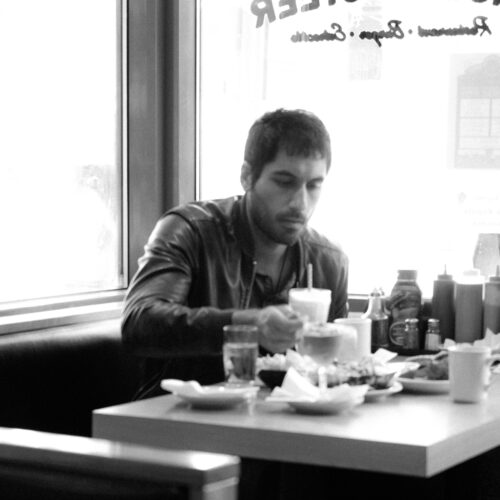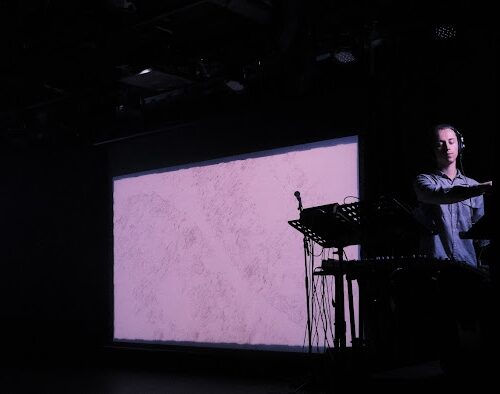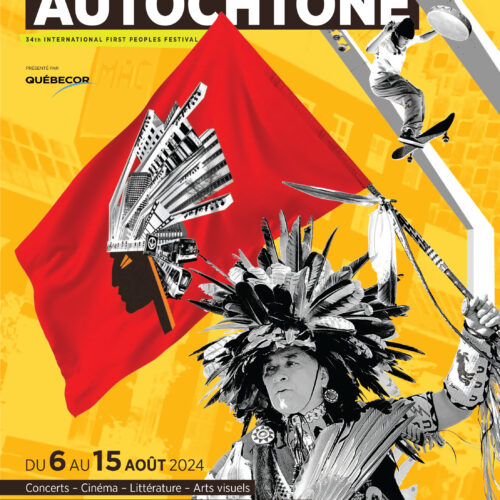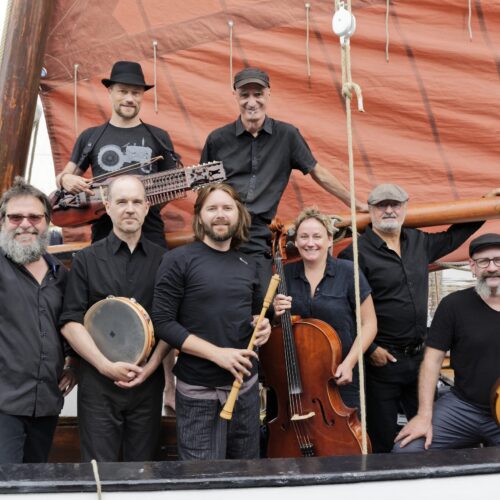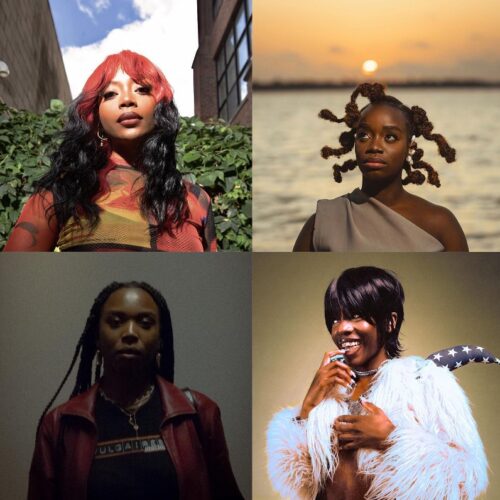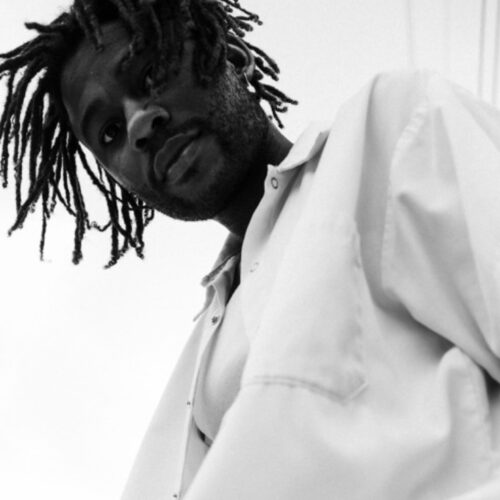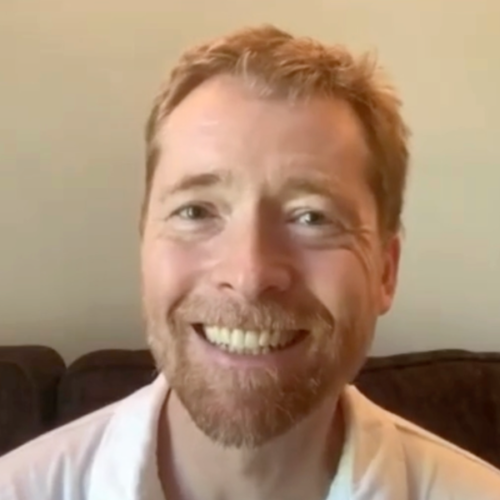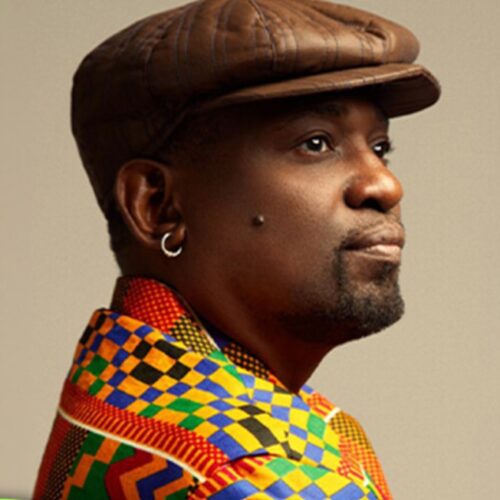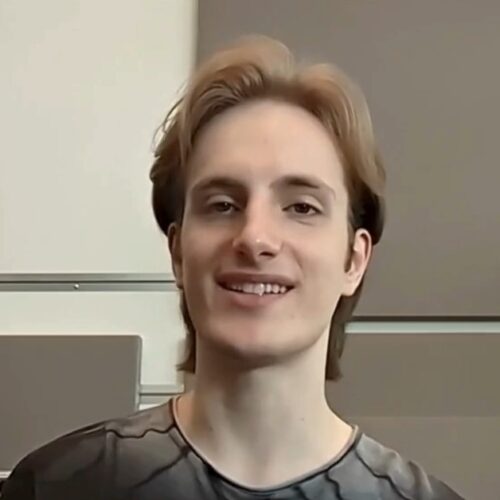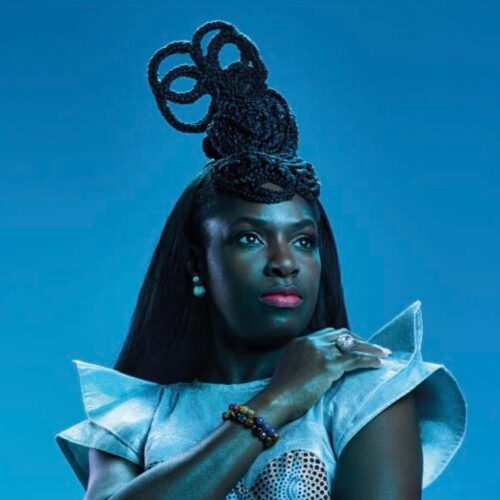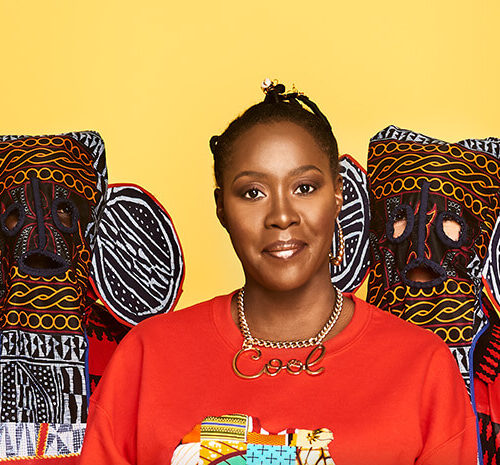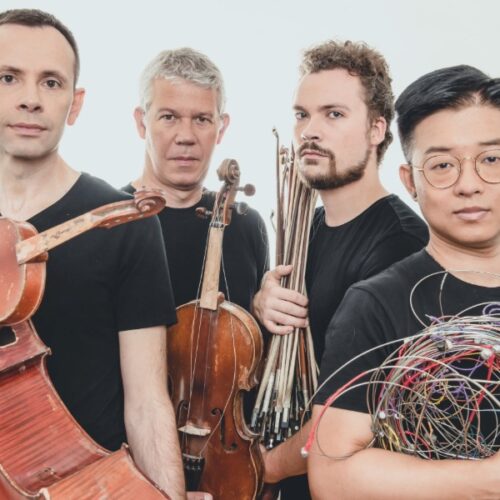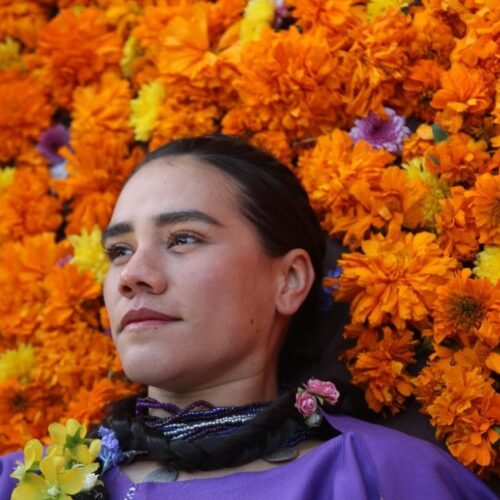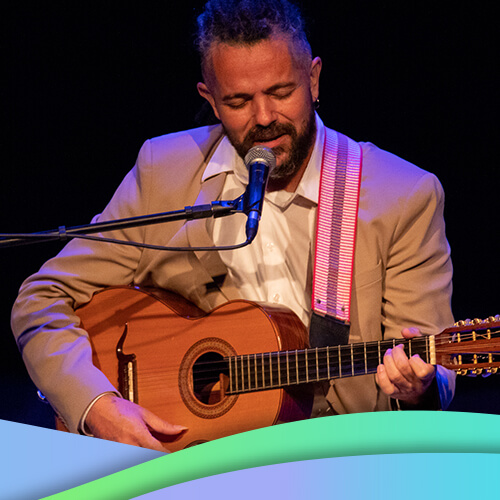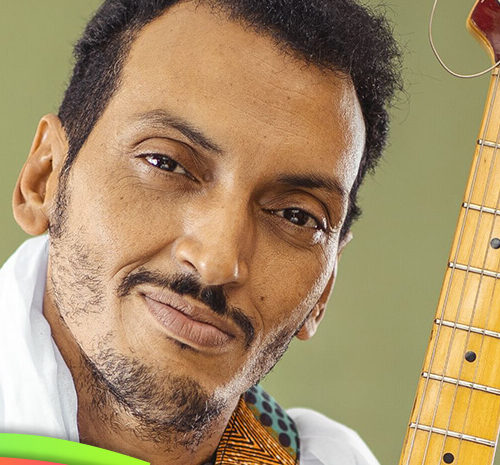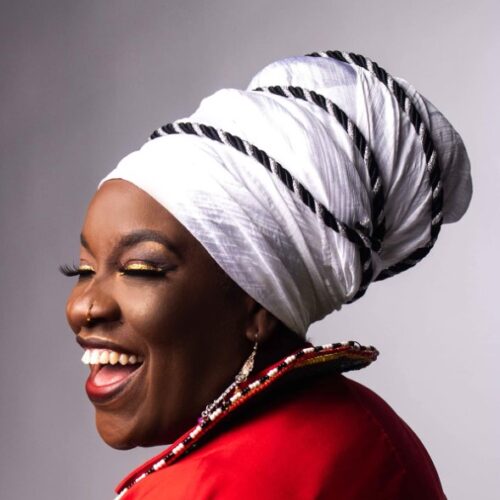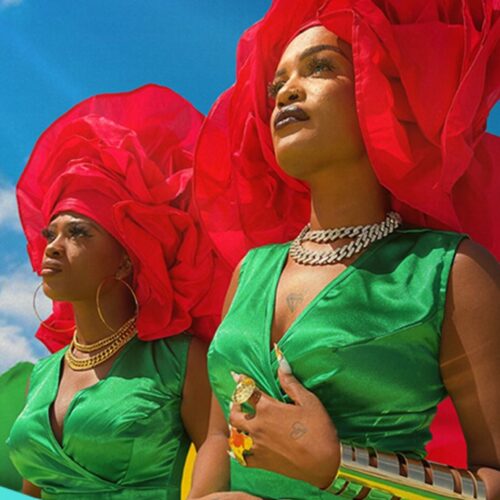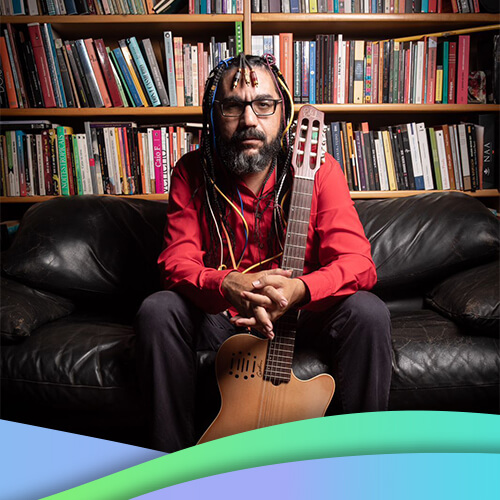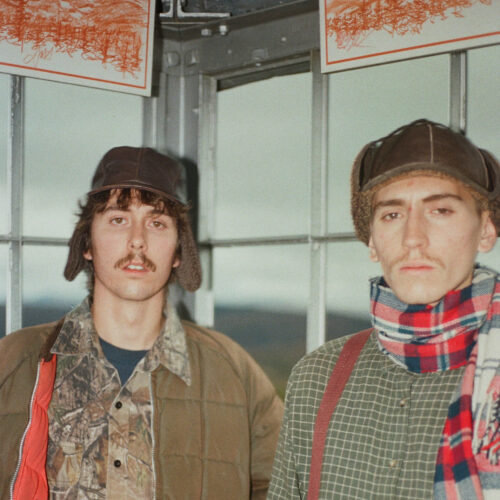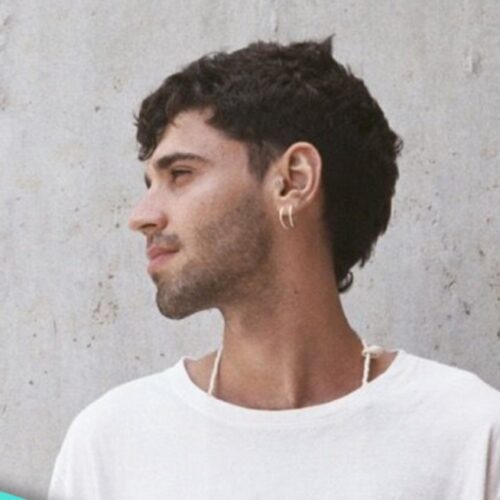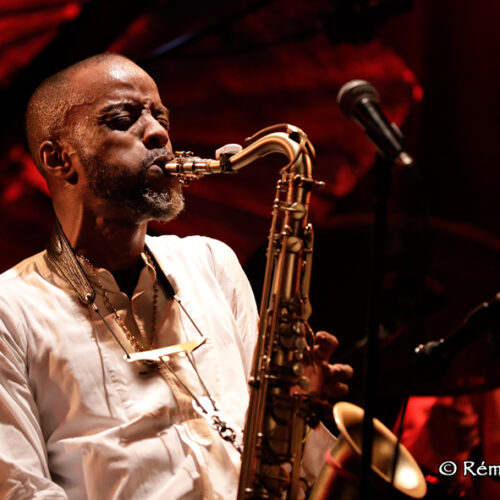Additional Information
Opening photo by Liv Hamilton
Meet Jacob Allen, better known by his stage moniker: Puma Blue. London-born and now Atlanta-based, Puma Blue’s initial success was thanks to his dusky, romantically melancholic approach to music, crafting a unique blend of neo-R&B, alternative rock, and jazz for an intimate, cloudy day vibe that you’d be hard-pressed to find elsewhere.
However, with his upcoming album Holy Waters on the cusp of release, we’re now seeing a revived chapter of growth in Allen’s aesthetic sensibilities. Vast and expansive, there’s a distinctly new sensation on the new album that shows us the true possibilities of Puma Blue—not only as a musician, but as a curator of taste and style across multiple visual, written, and sonic mediums.
PAN M 360 recently sat down with Allen for a conversation on the album’s creation, the inspiration behind its themes, the process of writing his notoriously metaphor-laden, poetic lyrics, and the pros and cons of communion with your younger self.
PAN M 360: It’s been a long road as you roll out singles and marketing for Holy Waters. Does that feel different from how you’ve handled the releases for your last album or your earlier work?
Jacob Allen: It does feel different but in a positive way. I feel like last time, we rolled out some singles and everything, but the world was still kind of closed down. And I remember, by the time that album came out, I was feeling very spiritually far away from it. Whereas this time, even though the first single technically came out last year—“Hounds,” we put that out, I think kind of ambitiously, hoping that the next singles could follow quite quickly, and the album could follow that. And it’s ended up being quite a gap.
But this time, I felt really prepared. I’ve had a lot more forethought about the visuals. And every time I’ve sat down for an interview like this, I feel like I know the album really well. And I can sort of answer questions from the heart rather than from the brain. And what’s weird is that, even though there’s been all this time, I still feel really proud of the album and really close to it, which I didn’t really have last time. I remember just feeling like, ‘Okay, it’s time to promote this thing that feels like from forever ago,’ whereas now, for whatever reason, this album still feels very fresh to me.
PAN M 360: Besides the music, what’s been most inspiring for the striking visual direction of Holy Waters?
JA: Lots of films, I suppose. There’s a couple that have been pretty inspired by John Cocteau films. He’s someone that my partner really put me on to—I already knew who he was, but more specifically, I think for his illustrations. Then, during the pandemic, he was kind of a reference point for her. We were watching a lot of his films and I was really drawn to a couple of them, and it’s sort of slowly seeped into my subconscious now, so I’ll have an idea and I’ll realize it’s referencing one of his films. So he was a big inspiration.
For the “O, The Blood!” video, which is the first time I’ve really directed properly, I just wanted to make an old TV show-type thing. So that was inspired by the “In Bloom” video from Nirvana and The Eric Andre Show. I was kind of wanting to show my sillier side. I feel like everyone probably assumes I’m quite a moody person. I’m not at all in real life, I don’t think. But I was looking back at all the videos and I was thinking, ‘Man, all the videos I grew up watching used to make me laugh.’ Like the Chili Peppers, Foo Fighters, or the Beastie Boys, there was always that something to make you laugh, and I was thinking it’s a shame I haven’t done that. So that was kind of the inspiration behind that one—what could I do that would be just like silly, like just a good time? And that was what came to mind for some reason.
I guess it’s been an interesting challenge to make everything feel cohesive with this album because it goes to so many different sonic places. But that ended up being a strength I think, just being able to keep it quite loose, and not such a particular aesthetic. I’ve got all these ideas that all feel true to the songs, and so the idea was just to keep them cohesive by using black and white all the way through. And hopefully, they all feel like they’re sort of the same album world. That’s given me a bit of freedom, in terms of how they’re shot or what the story is, or what I’m wearing, or whatever. It’s a bit more reflective of me, rather than being so narrow.
PAN M 360: Has anything surprised you, for better or for worse, about working and composing so much with the band versus the more independent work you were doing prior?
JA: I mean, the biggest thing was how much more proud I am of the music now, compared to before. Because I feel like I’m able to kind of step back from these finished recordings. And man, even when I was producing the stuff at home that we’d recorded in the studio, I was a lot more into it, because it would be the sound of like, Cam [Dawson] on the bass and Ellis [Dupuy] on the drums doing something really cool. So I was less self-conscious and more, almost listening as a fan. Which felt really fresh to me.
There were definitely some things that were hard, like when we’d hit a wall. It was a team hitting a wall as opposed to just, you know, on my own—it’s kind of easier to just call it quits and take a walk. But when you’re all together it feels like sometimes you have to push through a bit harder, and you can get discouraged for a second when it’s not working. But we ended up getting into a good rhythm when that would happen—just going for a swim in the sea and coming back 40 minutes later and feeling adjusted. A cold plunge.
But the other thing that was huge for me was how organically stuff happened. I think, by myself, there’s a limit to how cerebral the process can be. I love making music on my own, but with the band, it wasn’t so straightforward. Because some things would diverge into jams. There are just all these extra heads and hands that are going to make mistakes or come up with a weird idea. And yeah, some of the music that came from jams—how could that have happened on my own?
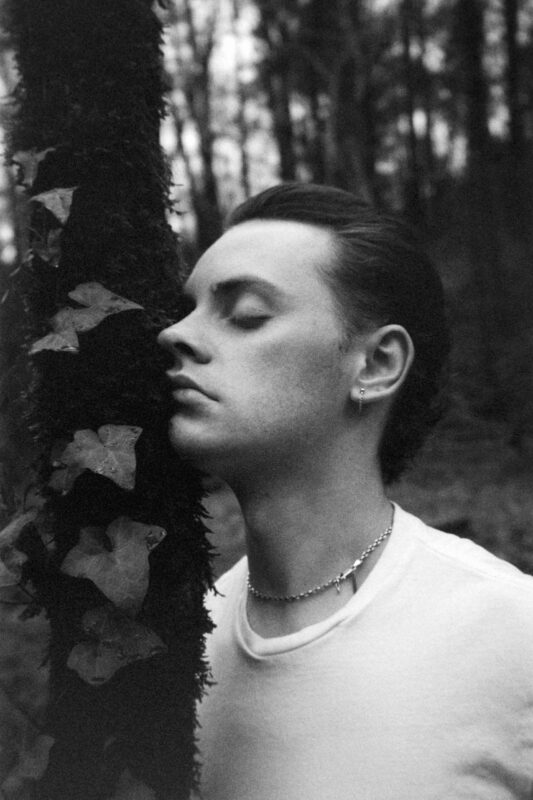
(Puma Blue) Jacob Allen / Liv Hamilton
PAN M 360: You’ve mentioned that Holy Waters centres a lot around death thematically, did you set out to do that or is it something that just arose as you worked on it?
JA: Definitely the latter. I was actually pretty stuck. I was having about a year-long period of writer’s block in 2021 that started around the end of 2020 and lasted until maybe the autumn of 2021. And I was writing things for sure, it wasn’t textbook writer’s block where I just had a blank page. I was definitely writing a lot of stuff, but I just didn’t like any of it. And I didn’t seem to be making any progress as an artist, and I was getting really stressed about it. Eventually, when I broke through that and started just having fun with music again, which was kind of the key, I think what helped was not having any limit on what I was doing. It was just like, I’m going to make music that feels like me, and feels like fun, and feels like it would be exciting to finish or to play with the guys. So there definitely wasn’t an idea of concept or theme. It was very open and I was just writing about whatever came to me.
And what’s so strange is that I did start to see a pattern. And it’s not on every song by any means—it’s not a concept album. But in a lot of them, I just kept thinking, ‘God, death is coming up a lot for me.’ So once I made that realization, I think it started this feedback loop where I would write about death more, or I’d consider it more when I was finishing lyrics, or later when I was examining the visuals, or even the tracklist and the order of the flow, some of these songs would pair well, just because of the themes. So yeah, it wasn’t an accident, but it definitely wasn’t something I set out to do from the start.
PAN M 360: Did it take a long time to come up with a sequence of songs that felt right?
JA: It did this time, yeah. I remember on the last album, I had such an idea from the beginning of how it would start and which tracks should go near the end. And the EPs, they’re short enough that it’s a pretty easy Rubik’s cube to solve. But this time—in a positive way, because I loved every track so much, and I didn’t feel like there was any point that was filler for me. And not that I think my last records have had such weak points, but there were definitely moments where it’s like, obvious: ‘Okay, this is a slamming song, and this is the more of a cloudy, ambient mood interlude piece.’
This time, there were songs that ended up being like tracks seven or eight, or whatever, where I considered putting them within the first three tracks, and it took a long time. And it wasn’t until I settled on which songs were being used that it started to be a bit easier. Now that I know it’s these 11, maybe it’s obvious that this one has to be the opener and so on. But I think what ended up helping me finish the sequence of it was a lesson I learned from the last project. I kind of get lethargic when I listen to the last album. And I wanted to make it kind of a sleepy headphone listen, but now when I listen back to it, I get a little itchy and I wish that it was like a few songs shorter or whatever.
So this time, I just want people to be pulled in—almost like the holy waters metaphor, you know, like a swirling that you’re sucked into. And I don’t want anyone to feel like they can pause it. I want it to feel like each track just leads into the next one, almost with a sense of urgency. So that was kind of the goal. And I don’t know if other people will feel it, but that’s definitely when I felt like it was done. When it was doing that sensation for me.
PAN M 360: Do you feel like the making of Holy Waters took you out of your comfort zone?
JA: Yeah, yeah it did. Even working with the band is the first thing that comes to mind. Because we’ve done so much together over the years live. But it’s very different from writing together. Even at the start, we weren’t supposed to write together. We just got into the studio to work on my demos and arrange them, and sort of do something with them live. And eventually, it just kind of became this thing where we were writing together. That definitely felt like pretty new territory and I wasn’t sure how that was gonna go. And there were challenges that just came up naturally during the process, where I was like, ‘Okay, I’ve never done this before, or dealt with this problem before, but I’m just gonna, you know, deal with it.’
I think also I’m so used to writing and producing in the box, on my laptop, and then finishing. What I tend to do is make a demo, not thinking that it’s going to end up as the final song. And then I’ll just work on a demo until it feels done. And I’m like, ‘Well, that demo is the song, you know, I wasn’t giving it enough credit before.’ And that’s why my shit I think has been so lo-fi in the past, maybe, because it’s everything is a demo that got finished. Whereas this time, I really was making demos, and then going into the studio and recording them, quote-unquote “properly,” or differently, I suppose is a better way of putting it. And then what I’ve never done before is bring stuff back from the studio and produce that. So that was a new challenge, trying to make this warm, but pretty flat acoustic sound from the studio, trying to bring that back into the sort of sonic world of mine, where it’s a bit more production-heavy and a bit more … dusty and ambient. It was tricky at first to start the process where it became this hybrid thing.
But eventually, I realized it wasn’t that different from what I’ve always done. It was just different ingredients and a slightly different approach. And it ended up being a bit more freeing. Instead of a programmed drum loop that I’ve got to program human feeling into, I’ve just got my friend playing the drums in a very human way. And I’ve got to find a way of making it sound a little bit more as if it’s a loop when I know that it isn’t, and that was a good way to do it. There was so much to work from. But it definitely took me out of my comfort zone once or twice. But I hope I hope that music always does, you know?
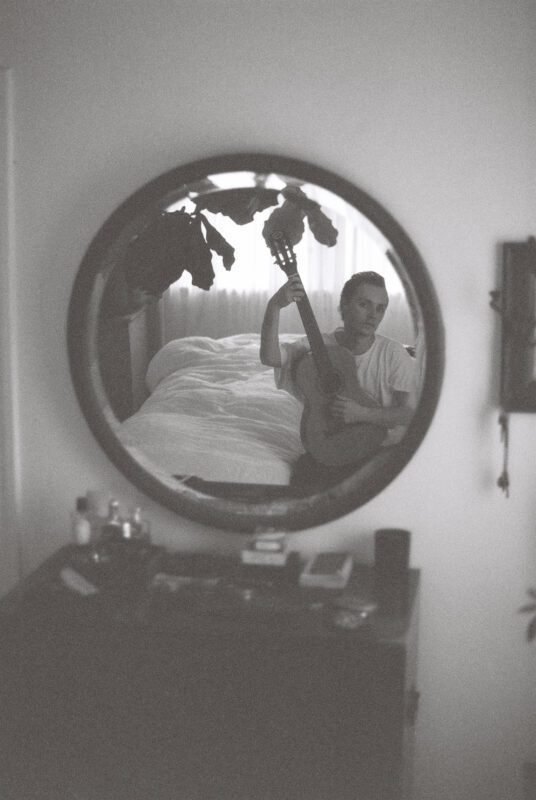
Puma Blue (Jacob Allen) / Natalie Hewitt
PAN M 360: Do you do any journaling or other writing that isn’t immediately meant to be lyrics? Do old words ever end up being used when you’re writing a new song?
JA: Absolutely. I write my dreams down. I did get into journaling for like, a month earlier this year or last year, and I kind of let it go, unfortunately. I feel like it’s a really good practice, but I just didn’t follow up on the discipline side of it. But I still write my dreams down. But aside from that, I’m writing poetry a lot. Probably more than I write lyrics—I feel like lyrics are such a specific thing. I usually only write lyrics when a song is already forming. I don’t know if that’s bad, maybe other songwriters write lyrics all the time. But once I know I’m writing for a song, then lyrics start happening. But I write poems all the time, and I’ve been thinking about whether I should publish some of them next year. Because I really, really love it. It’s a nice change of medium for me to only worry about the words. So, when I’m writing songs, I’ll often borrow stuff from my poems, or rehash it.
Sometimes I’ve got a poem that I really like, but it doesn’t lend itself to a song in the way that I’ve written it. So I have to kind of re-edit it. Not always to rhyme, but just the rhythm or whatever. So I find myself doing that a lot. I’ll even sometimes borrow just one line or something, and it will start a song of its own. That can be kind of interesting. “Velvet Leaves,” from the last album, was one of my longest poems ever, but only the chorus of the song is from the poem, and I don’t think the rest of the poem made it into the song at all. It ended up being a bit more realistic and direct in the lyrics and the verses, whereas the poem that the lyrics are from is a lot more abstract. And I think through this process, like you’re asking, a lot of subconscious stuff will come up.
For example, on this album, “Mirage” is a song about my friend who passed away. But she passed away years ago, like 2015 or 2016. So, that feels like a long time, and I’m not sitting around necessarily still grieving every day, at all. But I found myself writing music and singing, and what was coming up was undealt-with feelings around her. And the feeling of this time that I thought I had recognized her at a train station. And obviously, it wasn’t. I find it’s kind of freeing to be able to write about something that maybe you still have emotions attached to. I think the subconscious kind of holds onto a lot unless you deliberately expunge. That’s what therapy is really good for, I suppose. It’s like a cleaning out of the subconscious. There are other practices too, like meditation. But for me, I guess music is one of those practices.
PAN M 360: Do you ever worry about giving too much away to people in your life when you’re writing, like a friend of yours will realize you’ve written a song about them?
JA: Maybe there’s an example I’m forgetting, but honestly, no. I think first of all, I feel like I wear my heart on my sleeve around my close friends—most of the time. I mean, I can definitely be a guarded and sort of bashful person, but for the most part, I think I’m quite emotionally open. And there’s nothing in my songs that I’m embarrassed of, you know? And sometimes a song will feel bold when I write it. And then once I’ve finished it, or maybe once it’s out, it sort of no longer feels bold. I just feel like, ‘Well, I said that thing, and now that it’s out there, I’m not embarrassed.’
But there are times I’ve wondered if this person will clock that this is for them. Particularly with the earliest stuff that I was releasing, you know, there’s a lot of songs about heartbreak or crushes. And I’m not really one to tell people when a song is about them, to be honest. So there were times when I was kind of like, do I want them to know? Or do I not want them to know? So I would just keep it to myself and wonder.
With this album, there’s not so much of that. The songs that are directly about someone are about my partner, and I can talk to her freely about that. And it’s really nice. There are two about my grandparents, and they’re no longer with me. So if anything, I wish I could share with them, and I can’t. There’s one about my friend that passed, as I mentioned—and maybe that’s the one where I’m like, unsure of how it will feel out there in the world. But that was just some personal reflection, so I can’t really worry about it. And for the first time, I feel like the rest of the songs—something I feel like I haven’t really done before—are just singing about ideas, feelings, and concepts that are not centered around a person.
I feel like if I can look back at most of my music, there’s some kind of subject—as in a person as a subject. Someone I’m singing to or about. Songs like “Too Much,” or “Falling Down,” or “Light is Gone,” they feel a little bit more contemplative. And it’s taken me a long time to really get there. I mean, there have been examples before, but I still feel like most of them have some kind of subject involved somehow. It’s been really cool to write stuff that isn’t necessarily always about people. I think another side of that is I try not to say anything in songs that I wouldn’t be comfortable saying in real life. It’s not such a dirty secret thing for me. It’s either things I wish I had said, or could say, or it’s just things that I’m openly feeling. I don’t tend to write anything bitter, where I shouldn’t say that to someone’s face. I don’t know, maybe time will tell. Maybe on the next album, there’ll be songs that feel that way. But for now, I feel pretty comfortable being open with the songs and what they’re about, which is a good feeling.
PAN M 360: If you could go back and talk to Jacob in 2016 and 2017 as he was working on Swum Baby, would you want to tell him anything?
JA: Oh, man. Um… I mean, in a way, no, I don’t want to talk to him. Because everything happened the way it was supposed to, right? That’s the problem with time travel. Well, I guess he probably needed to know things were going to be okay. I wasn’t doing so well back then. I was pretty depressed. I mean, I was excited about making the EP, so that kind of kept me going. But it would have been so nice to have some kind of affirmation from the future, I suppose. But you have to figure that out on your own, and in a way, I’m saying it now. So maybe in the past, I somehow knew it was going to be okay. But I would have just loved to have had a hug or something from my future self. Some kind of comforting knowledge of how things were gonna turn out. I probably would have just taken myself out for a walk and got some fucking sunlight. That would have been really healthy.
I think in a weird way, what I’d love to do is show myself the music from this album. That would be really interesting. Because it feels so much more evolved than my shit from back then and it feels a lot more confident and better reflective of who I am, and that might be really encouraging—because it took a long time to really get here. I guess, in short, my answer is no. [Laughs] You need to figure it out. But of course, if I could give some love to myself back then somehow, that would be really nice. I was kind of on the cusp, during the making of that EP. Things had been up and down, but pretty good before. But once it got to that point in time, I was kind of on the cusp. Like, within about six months, things were gonna really start looking up for me, but they were at their low point in a major way. And so even a message from a year in the future would have probably helped a lot.
It’s such a weird concept because I don’t know that it would have helped. I probably would have just kept worrying. It wouldn’t have cured my depression to hear from my future self. I had to go through that time to evolve and transform at that pace. But I think all in all, my younger me would be really psyched about this record—I think any of my younger selves, but especially the further and further I go back. I think my 12-year-old self would be so into this album, and that’s a really nice feeling.

